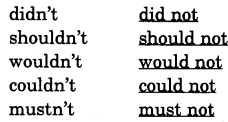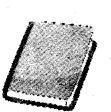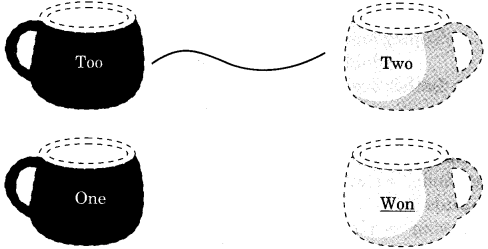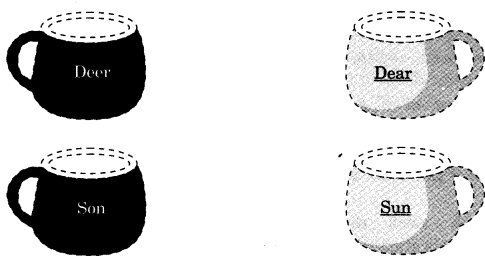NCERT Solutions for Class 4 English Unit-5
(i) PONT BE AFRAID OF THE DARK
QUESTIONS FROM TEXTBOOK SOLVED
Reading is Fun
1.What is the poem about?
Ans.The poem is about children’s fear of darkness of the night and the ways to overcome this fear. ‘
2.What happens when the day is over?
Ans.When the day is over darkness spreads everywhere. The moon and stars start shining in the sky.
3.What does the earth do when the day is over?
Ans.The earth takes rest when the day is over.
4.What does the poet want us to do at night?
Ans.The poet wants us to be friendly with night and think about our friends and relatives.
5.Are these sentences TRUE or FALSE? .
(а) The poet tells the child to be afraid when it is dark._______
(b) The poet says that stars will always shine at night._______
(c) The poet tells the child to think of friends after it is dark._______
Ans.(a) False (b) True (c) True
Word Building
1.Find a word in the poem which is the opposite of —
Ans.![]()
2.Look at these words in the poem
don’t, won’t
Here are their full forms
don’t — do not won’t — will not
Now, write the full forms of the following words:
Let’s Talk,
1.Are you afraid of the dark? Why?
Ans. Yes, I am afraid of the dark because I fail to see anything in the darkness.
2.What do you do when it is dark?
Ans.I lie down on my bed and think about my friends.
3.Have you ever heen very frightened? Tell your partner about it.
Ans.I was sitting alone is my room. Suddenly my elder brother entered the room wearing a mask of a giant. He stood in front of me and started laughing horribly. I cried loudly in great fear. I can’t forget that incident.
Say Aloud
1.What is the word that starts with ‘t’ rhymes with ‘cease’, and means to playfully make fun of?
Ans.Tease
2.What is the word that starts with ‘c’, rhymes with ‘near’ and Tear’, and means easy to see, hear and understand?
Ans. Clear.
3.Where did the tip of the tongue touch?
Ans. It touches the teeth ridge.
4.Listen and repeat Ca -t
Ans. Do yourself.
5.Did you hear what your tongue did?
Ans. Do yourself.
6.Say these words and feel what your tongue does when you say- toe, top, tie, ten.
Ans. Do yourself
Work in Pairs
Make the ‘cough’ sound.
I came down
I coughed “K, k, k, k!”
And cough again “K, k, k, k!”
Did you hear the ‘K’ sound
at the end of the word ‘book’?
Repeat
book look neck duck chick sack clock
All these words start with the same sound
Team Time
1. Divide the class into four groups.
Ans. Do it yourself.
2. Imagine life without the sun.
Ans. Do it yourself.
3. What are the things that may happen if there is no sunlight?
Ans. There will be complete darkness if there is no sunlight.
4. Discuss with the group and write your ideas in your notebook.
Ans. Do it yourself.
Let’s Write
1. The red tea cups are filled with a particular word. Fill in the yellow tea cups with similar sounding words. Note the example given.

2. Now complete the following sentences, choosing the right word.
Ans.
(а) The sum was too difficult for the class to solve. Only two students could do it. (two, too)
(b) There was only one boy who won the prize, (one, won)
(c) The golden deer was very dear to him. (dear, deer)
(d) Ramu’s son loved to play in the sun, (sun, son)
Let’s Listen
1. Relax your feet, legs and entire body. Be as quite as you can.
Ans. Do yourself.
2. Listen to the sounds around you.
Ans. Do yourself.
3. Tell your partner softly what you heard and ask, “What did you hear?”
Ans. Do yourself.
4. Let your partner talk about or copy those sounds.
Ans. Do yourself.
5. Read out the following phrases aloud. Divide them into loud and softer sounds.
Ans.
(ii) HELEN KELLER
QUESTIONS FROM TEXTBOOK SOLVED
Reading is Fun
1.“Something is wrong,” said Helen’s mother. What was wrong with Helen?
Ans. She could not see or hear.
2.Although Helen could not hear or see, what kind of girl was she?
Ans. She was a bright little girl.
3.Who agreed to help Helen?
Ans. Miss Sullivan, a young teacher, agreed to help Helen.
4.How did Miss Sullivan help Helen? ?
Ans. Miss Sullivan taught Helen many words with the help of special hand signs. She made her understand the importance of words.
5.What did Helen learn when the teacher put her hand into the running water?
Ans. Helen understood that water meant something wet, running over her hand.
6.What was the most important thing that Helen finally understood?
Ans. Finally Helen understood that words were the most important things in the world. Words would tell her everything she wanted to know.
Let’s Talk
1.Using sign language make these letters with your hand.
‘C’, ‘H’, ‘E’, ‘K’.
Ans. Do it yourself.
2.Spell these words through hand signs.
(a) Helen (b) was
Ans. Do it yourself.
3.How do people who cannot see, read?
Ans. Such people read with the help of special sign language.
4.What is the script for children who cannot see called?
Ans. Braille script.
5.How do you think you can help children who cannot see?
Ans. Do it yourself.
6.Look at the signs for the letters of the alphabet.
Ans. See T.B. pp. 85, 86 and 87 and learn the signs.
Let’s Write
1. Match the two parts of sentences given under column ‘A’ or ‘B’. Add ‘but’ to join the two parts and write complete sentences
Ans.










